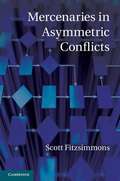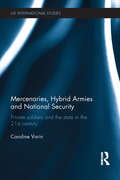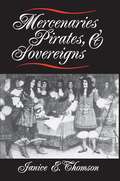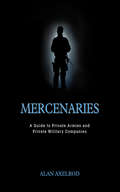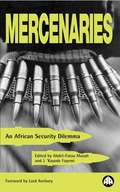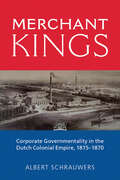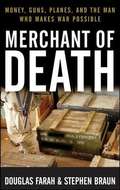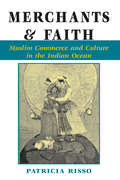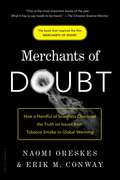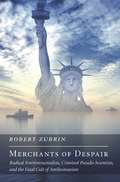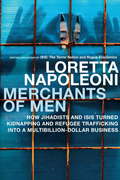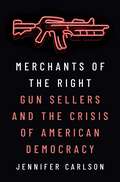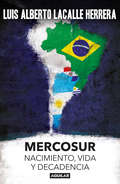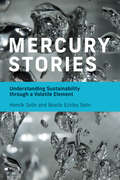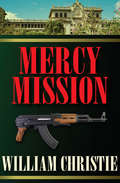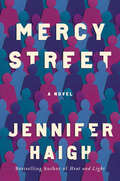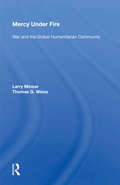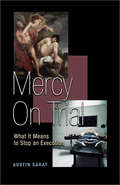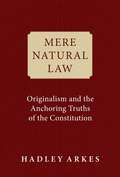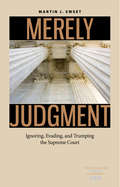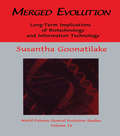- Table View
- List View
Mercenaries in Asymmetric Conflicts
by Scott FitzsimmonsScott Fitzsimmons argues that small mercenary groups must maintain a superior military culture to successfully engage and defeat larger and better-equipped opponents. By developing and applying competing constructivist and neorealist theories of military performance to four asymmetric wars in Angola and the Democratic Republic of Congo, he demonstrates how mercenary groups that strongly emphasize behavioral norms encouraging their personnel to think creatively, make decisions on their own, take personal initiative, communicate accurate information within the group, enhance their technical proficiency and develop a sense of loyalty to their fellow fighters will exhibit vastly superior tactical capabilities to other mercenary groups. Fitzsimmons demonstrates that although the victorious mercenary groups occasionally had access to weapon systems unavailable to their opponents, the balance of material capabilities fielded by the opposing military forces had far less influence on the outcome of these asymmetric conflicts than the culturally determined tactical behavior exhibited by their personnel.
Mercenaries, Hybrid Armies and National Security: Private Soldiers and the State in the 21st Century (LSE International Studies Series)
by Caroline VarinThis book assesses the use of ‘mercenaries’ by states, and their integration into the national armed forces as part of a new hybridisation trend of contemporary armies. Governments, especially in the West, are undertaking an unprecedented wave of demilitarisation and military budget cuts. Simultaneously, these same governments are increasingly opening their armies up to foreign nationals and outsourcing military operations to private companies. This book explores the impact of this hybridisation on the values, cohesion and effectiveness of the armed forces by comparing and contrasting the experiences of the French Foreign Legion, private military companies in Angola, and the merging of private contractors and American troops in Iraq. Examining the employment of foreign citizens and private security companies as military forces and tools of foreign policy, and their subsequent impact on the national armed forces, the book investigates whether the difficulties of coordinating soldiers of various nationalities and allegiances within public-private joint military operations undermines the legitimacy of the state. Furthermore, the author questions whether this trend for outsourcing security can realistically provide a long term and positive contribution to national security. This book will be of much interest to students of private military companies, strategic studies, international security and IR in general.
Mercenaries, Pirates, and Sovereigns: State-Building and Extraterritorial Violence in Early Modern Europe (Princeton Studies in International History and Politics #48)
by Janice E. ThomsonThe contemporary organization of global violence is neither timeless nor natural, argues Janice Thomson. It is distinctively modern. In this book she examines how the present arrangement of the world into violence-monopolizing sovereign states evolved over the six preceding centuries.
Mercenaries: A Guide to Private Armies and Private Military Companies
by Alan AxelrodMercenaries have been active in battle from the beginning of military history and, as private armies and military support firms, they are a major component of warfare today. Security, military advice, training, logistics support, policing, technological expertise, intelligence, transportation—all are outsourced to a greater or lesser degree in the U.S. military. However, privatization is not a uniquely American phenomenon. Countries as diverse as Saudi Arabia and Australia rely on privatization in one form or another. Historically, heads of state, politicians, and other administrators have justified use of mercenaries on the basis of their effectiveness, and cost-savings. These reasons and others continue to serve as rationales for use of private military companies in military strategy. Mercenaries: A Guide to Private Armies and Private Military Companies provides a comprehensive survey and guide to mercenary forces, entrepreneurs, and corporations active on the international military scene today, including a concise history of mercenaries and private armies on land, sea, and in the air. Narrative chapters are amply supplemented by sidebars including biographies of major figures, key statistics, historical and current documents, contracts, and legislation on private armies and outsourced military services. Each chapter includes a bibliography of books, journal articles, and web sites, and a general bibliography concludes the entire work.
Mercenaries: A Guide to Private Armies and Private Military Companies
by Alan AxelrodMercenaries have been active in battle from the beginning of military history and, as private armies and military support firms, they are a major component of warfare today. Security, military advice, training, logistics support, policing, technological expertise, intelligence, transportation—all are outsourced to a greater or lesser degree in the U.S. military. However, privatization is not a uniquely American phenomenon. Countries as diverse as Saudi Arabia and Australia rely on privatization in one form or another. Historically, heads of state, politicians, and other administrators have justified use of mercenaries on the basis of their effectiveness, and cost-savings. These reasons and others continue to serve as rationales for use of private military companies in military strategy. Mercenaries: A Guide to Private Armies and Private Military Companies provides a comprehensive survey and guide to mercenary forces, entrepreneurs, and corporations active on the international military scene today, including a concise history of mercenaries and private armies on land, sea, and in the air. Narrative chapters are amply supplemented by sidebars including biographies of major figures, key statistics, historical and current documents, contracts, and legislation on private armies and outsourced military services. Each chapter includes a bibliography of books, journal articles, and web sites, and a general bibliography concludes the entire work.
Mercenaries: An African Security Dilemma
by Abdel-Fatau Musah J. 'Kayode Fayemi Kayode FayemiThis powerful book critiques mercenary involvement in post-Cold War African conflicts. The contributors investigate the links between the rise in internal conflicts and the proliferation of mercenary activities in the 1990s; the distinction in the methods adopted by Cold War mercenaries and their contemporary counterparts; the convoluted network between private armies; business interests and sustained poverty in Africa’s poorest countries; and the connection between mercenary activities and arms proliferation. Countries discussed include Sierra Leone, Zaire, Angola, Uganda and Congo.
Merchant Kings: Corporate Governmentality in the Dutch Colonial Empire, 1815–1870
by Albert SchrauwersIn the nineteenth century, the Netherlands and its colonial holdings in Java were the sites of dramatically increased industrialization. Led by a group of “merchant kings” who exemplified gentlemanly capitalism, this ambitious trading project transformed the small, economically moribund Netherlands into a global power. Merchant Kings offers a fascinating interdisciplinary exploration of this episode and reveals not only the distinctive nature of the Dutch state, but the surprising extent to which its nascent corporate innovations were rooted in early welfare initiatives. By placing colony and metropole into a single analytical frame, this book offers a bracing new approach to understanding the development of modern corporations.
Merchant Of Death: Money, Guns, Planes, and the Man Who Makes War Possible
by Douglas Farah Stephen BraunTwo respected journalists tell the incredible story of Viktor Bout, the Russian weapons supplier whose global network has changed the way modern warfare is fought. <P><P>Bout’s vast enterprise of guns, planes, and money has fueled internecine slaughter in Africa and aided both militant Islamic fanatics in Afghanistan and the American military in Iraq. <P><P>This book combines spy thrills with crucial insights on the shortcomings of a U.S. foreign policy that fails to confront the lucrative and lethal arms trade that erodes global security.
Merchants And Faith: Muslim Commerce And Culture In The Indian Ocean (New Perspectives On Asian History Ser.)
by Patricia A RissoThe intersection of Islamic history and Indian Ocean history is vast but inadequately explored. It is essential to understanding how and why Islam influenced Asia and to determining the extent to which maritime success affected the mostly land-based Muslim political powers. This area of research has elicited a lively debate involving scholars as diverse as William McNeill, K. N. Chaudhuri, Niels Steensgaard, Philip Curtin, and Janet Abu-Lughod. Merchants and Faith provides an insightful overview of this debate and addresses the major questions raised by it: What were the relationships between littoral Asia and land-based empires? How can we best explain the role played by West Europeans? What difference did it make to be a Muslim merchant? Other considerations are the production roles of China and Hindu India and the nature of the Asian trade revolution.General histories of Islamic Asia seldom draw upon the rich literature on the Indian Ocean region; Indian Ocean studies are often couched in the technical jargon of economic theories and are occasionally marred by ideological bias. To make all of this literature more accessible to a general audience and to students, Merchants and Faith distills the results and implications of this research and connects them to the well-established features of Islamic political history.
Merchants Of Doubt: How A Handful Of Scientists Obscured The Truth On Issues From Tobacco Smoke To Global Warming
by Naomi Oreskes Erik M. Conway"Merchants of Doubt should finally put to rest the question of whether the science of climate change is settled. It is, and we ignore this message at our peril."-Elizabeth Kolbert<P><P> "Brilliantly reported andwritten with brutal clarity."-Huffington Post<P> Now a powerful documentary from the acclaimed director of Food Inc., Merchants of Doubt was one of the most talked-about climate change books of recent years, for reasons easy to understand: It tells the controversial story of how a loose-knit group of high-level scientists and scientific advisers, with deep connections in politics and industry, ran effective campaigns to mislead the public and deny well-established scientific knowledge over four decades. The same individuals who claim the science of global warming is "not settled" have also denied the truth about studies linking smoking to lung cancer, coal smoke to acid rain, and CFCs to the ozone hole. "Doubt is our product," wrote one tobacco executive. These "experts" supplied it.
Merchants of Despair
by Robert ZubrinThere was a time when humanity looked in the mirror and saw something precious, worth protecting and fighting for--indeed, worth liberating. But now, we are beset on all sides by propaganda promoting a radically different viewpoint. According to this idea, human beings are a cancer upon the Earth, a horde of vermin whose aspirations and appetites are endangering the natural order. This is the core of antihumanism.Merchants of Despair traces the pedigree of this ideology and exposes its pernicious consequences in startling and horrifying detail. The book names the chief prophets and promoters of antihumanism over the last two centuries, from Thomas Malthus through Paul Ehrlich and Al Gore. It exposes the worst crimes perpetrated by the antihumanist movement, including eugenics campaigns in the United States and genocidal anti-development and population-control programs around the world.Combining riveting tales from history with powerful policy arguments, Merchants of Despair provides scientific refutations to all of antihumanism's major pseudo-scientific claims, including its modern tirades against nuclear power, pesticides, population growth, biotech foods, resource depletion, and industrial development.
Merchants of Grain
by Dan MorganThe first and only book to describe the seven secretive families and five far-flung companies that control the world's food supplies. Little has changed their central role since Morgan's best-selling book first appeared in 1979.
Merchants of Men: How Jihadists and ISIS Turned Kidnapping and Refugee Trafficking into a Multi-Billion Dollar Business
by Loretta NapoleoniA powerful and sophisticated underground business delivers thousands of refugees a day all along the Mediterranean coasts of Europe. The new breed of criminals that controls it has risen out of the political chaos of post-9/11 Western foreign policy and the fiasco of the Arab Spring. These merchants of men are intertwined with jihadist armed organizations such as al Qaeda in the Maghreb. They have prospered smuggling cocaine from West Africa and kidnapping Westerners. More recently, the destabilization of Syria and Iraq coupled with the rise of ISIS offered them new business opportunities in the Middle East, from selling Western hostages to jihadist groups to trafficking in refugees numbering in the millions.Overall, the kidnapping industry today is bigger than the illegal drug trade and worth hundreds of billions of dollars annually. Merchants of Men is based on exclusive access to hostage negotiators actively involved in ransom negotiations and rescue missions, counter-terrorism experts, members of security services, and former hostages, among many others. The reader will discover that the protocols of prevention and rescue change according to the type of abduction and the designated targets, and will come to know first hand the range of experiences of kidnapping victims.Will the West once again reap the benefits of the political chaos it has sown in its own backyard? From colonization to the advent of "friendly" dictatorial regimes, today's fast-aging European nations are buyers on the refugee market. New workers are needed, and the merchants of men are supplying them. But only skilled, highly educated refugees are wanted. As a tsunami of migrants and refugees floods Europe, new questions almost too numerous to count must be answered.From the Hardcover edition.
Merchants of the Right: Gun Sellers and the Crisis of American Democracy
by Jennifer CarlsonAn eye-opening portrait of the gun sellers who navigated the social turmoil leading up to the January 6 Capitol attackGun sellers sell more than just guns. They also sell politics. Merchants of the Right sheds light on the unparalleled surge in gun purchasing during one of the most dire moments in American history, revealing how conservative political culture was galvanized amid a once-in-a-century pandemic, racial unrest, and a U.S. presidential election that rocked the foundations of American democracy.Drawing on a wealth of in-depth interviews with gun sellers across the United States, Jennifer Carlson takes readers to the front lines of the culture war over gun rights. Even though the majority of gun owners are conservative, new gun buyers are more likely to be liberal than existing gun owners. This posed a dilemma to gun sellers in the run-up to the 2020 presidential election: embrace these liberal customers as part of a new, perhaps post-partisan chapter in the American gun saga or double down on gun politics as conservative terrain. Carlson describes how gun sellers mobilized mainstays of modern conservative culture—armed individualism, conspiracism, and partisanship—as they navigated the uncertainty and chaos unfolding around them, asserting gun politics as conservative politics and reworking and even rejecting liberal democracy in the process.Merchants of the Right offers crucial lessons about the dilemmas confronting us today, arguing that we must reckon with the everyday politics that divide us if we ever hope to restore American democracy to health.
Merciful Judgments and Contemporary Society
by Austin SaratMerciful Judgments and Contemporary Society: Legal Problems, Legal Possibilities explores the tension between law's need for and dependence on merciful judgments and suspicions that regularly accompany them. Rather than focusing primarily on definitional questions or the longstanding debate about the moral worth and importance of mercy, this book focuses on mercy as a part of, and problem for, law. This book is a product of the University of Alabama School of Law symposia series on 'Law, Knowledge and Imagination'. It explores the ways law is known and imagined in a diverse array of disciplines, including political science, history, cultural studies, philosophy and science. In addition, books produced through the Alabama symposia explore various conjunctions of law, knowledge and imagination as they play out in debates about theory and policy and speak to venerable questions as well as contemporary issues.
Mercosur: Nacimiento, vida y decadencia
by Luis Alberto Lacalle- El Mercosur ha sido, desde sus inicios, objeto de múltiples debates y confrontaciones. ¿Se trata de una herramienta útil? ¿Aporta al desarrollo de los países que lo integran, o limita sus posibilidades de vincularse con el resto del mundo? ¿Debe tener una orientación económica o política? ¿Cómo se resuelven las asimetrías entre los países grandes y los pequeños? El Dr. Luis Alberto Lacalle Herrera, protagonista del proceso gestacional del Mercosur y sus primeros años de desarrollo, aporta su mirada lúcida e incisiva a este debate de profunda vigencia e importancia. Con una prosa que discurre con agilidad, y que no rehúye al compromiso con las propias convicciones y a la mención de los momentos difíciles del proceso, estas páginas se convierten en un aporte para comprender los procesos internos que marcaron la historia de este proyecto de integración regional. Este libro es un aporte fundamental para comprender los vaivenes que han atravesado los países en torno al Mercosur, y su reflexión se orienta hacia el desarrollo de la región, de cara al futuro.
Mercury Stories: Understanding Sustainability through a Volatile Element
by Henrik Selin Noelle Eckley SelinAn interdisciplinary analysis of human interactions with mercury through history that sheds light on efforts to promote and achieve sustainability.In Mercury Stories, Henrik Selin and Noelle Eckley Selin examine sustainability through analyzing human interactions with mercury over thousands of years. They explore how people have made beneficial use of this volatile element, how they have been harmed by its toxic properties, and how they have tried to protect themselves and the environment from its damaging effects. Taking a systems approach, they develop and apply an analytical framework that can inform other efforts to evaluate and promote sustainability.
Mercy Mission
by William ChristieIn this nerve-wracking sequel to THE WARRIORS OF GOD, Richard Welsh returns, now working as an aide to a U.S. Senator.Three U.S. Marine security guards are gunned down by unknown assailants at an outdoor café in Guatemala City, far from Afghanistan and the world's attention. Could it be terrorism, or backlash from the war on drugs?Welsh is sent down to Guatemala to investigate, for the most mundane of reasons: the father of one of the dead Marines was a major political contributor. No one expects him to find out anything, least of all himself. But, as soon as he arrives in Guatemala City, he falls into a series of discoveries, each one more disturbing than the last.The attack on the Marines seems to stretch from events as far back as the dirty guerrilla wars of the 80's to the mountains of drugs making their way along Central American pathways from Colombia to Mexico today. Circumstances force Welsh together with a mysterious American woman whose motives are unclear. She may be his ally, or she may regard him as a sacrificial pawn in pursuit of her own agenda. When the final crucial piece of information comes into Welsh's hands it will take every last bit of luck and skill for him to make it out of Guatemala alive.Because, strangely enough, it seems that as many people in Washington as in Guatemala want him dead.There are many jungles, from the tropical rainforest to Washington back rooms. But in each case the most dangerous predator is always the same.
Mercy Street
by Jennifer Haigh“Ms. Haigh is an expertly nuanced storyteller long overdue for major attention. Her work is gripping, real, and totally immersive, akin to that of writers as different as Richard Price, Richard Ford, and Richard Russo.”—Janet Maslin, New York TimesThe highly anticipated new novel by acclaimed New York Times bestselling author Jennifer Haigh—“a gifted chronicler of the human condition” (Washington Post Book World)—is a tense, riveting story about the disparate lives that intersect at a women’s clinic in Boston.For almost a decade, Claudia has counseled patients at Mercy Street, a clinic in the heart of the city. The work is consuming, the unending dramas of women in crisis. For its patients, Mercy Street offers more than health care; for many, it is a second chance.But outside the clinic, the reality is different. Anonymous threats are frequent. A small, determined group of anti-abortion demonstrators appears each morning at its door. As the protests intensify, fear creeps into Claudia’s days, a humming anxiety she manages with frequent visits to Timmy, an affable pot dealer in the midst of his own existential crisis. At Timmy’s, she encounters a random assortment of customers, including Anthony, a lost soul who spends most of his life online, chatting with the mysterious Excelsior11—the screenname of Victor Prine, an anti-abortion crusader who has set his sights on Mercy Street and is ready to risk it all for his beliefs. Mercy Street is a novel for right now, a story of the polarized American present. Jennifer Haigh, “an expert natural storyteller with a keen sense of her characters’ humanity” (New York Times), has written a groundbreaking novel, a fearless examination of one of the most divisive issues of our time.
Mercy Under Fire: War And The Global Humanitarian Community
by Larry MinearFrom Bosnia to Somalia, and most recently from Rwanda to Angola and the Sudan, humanitarian aid and international interventions have gone awry. Although the need for humanitarian assistance has not diminished in the wake of the Cold War, success stories will almost certainly be harder to come by. This book addresses that grim prospect. Based on sch
Mercy on Trial: What It Means to Stop an Execution
by Austin SaratOn January 11, 2003, Illinois Governor George Ryan--a Republican on record as saying that "some crimes are so horrendous . . . that society has a right to demand the ultimate penalty"--commuted the capital sentences of all 167 prisoners on his state's death row. Critics demonized Ryan. For opponents of capital punishment, however, Ryan became an instant hero whose decision was seen as a signal moment in the "new abolitionist" politics to end killing by the state. In this compelling and timely work, Austin Sarat provides the first book-length work on executive clemency. He turns our focus from questions of guilt and innocence to the very meaning of mercy. Starting from Ryan's controversial decision, Mercy on Trial uses the lens of executive clemency in capital cases to discuss the fraught condition of mercy in American political life. Most pointedly, Sarat argues that mercy itself is on trial. Although it has always had a problematic position as a form of "lawful lawlessness," it has come under much more intense popular pressure and criticism in recent decades. This has yielded a radical decline in the use of the power of chief executives to stop executions. From the history of capital clemency in the twentieth century to surrounding legal controversies and philosophical debates about when (if ever) mercy should be extended, Sarat examines the issue comprehensively. In the end, he acknowledges the risks associated with mercy--but, he argues, those risks are worth taking.
Mere Civility
by Teresa M. BejanIn liberal democracies committed to tolerating diversity as well as disagreement, the loss of civility in the public sphere seems critical. But is civility really a virtue, or a demand for conformity that silences dissent? Teresa Bejan looks at early modern debates about religious toleration for answers about what a civil society should look like.
Mere Natural Law: Originalism and the Anchoring Truths of the Constitution
by Hadley ArkesOriginalism Is Not Enough In this profoundly important reassessment of constitutional interpretation, the eminent legal philosopher Hadley Arkes argues that &“originalism&” alone is an inadequate answer to judicial activism. Untethered from &“mere Natural Law&”—the moral principles knowable by all—our legal and constitutional system is doomed to incoherence. The framers of the Constitution regarded the &“self-evident&” truths of the Natural Law as foundational. And yet in our own time, both liberals and conservatives insist that we must interpret the Constitution while ignoring its foundation. Making the case anew for Natural Law, Arkes finds it not in theories hovering in the clouds or in benign platitudes (&“be generous,&” &“be selfless&”). He draws us back, rather, to the ground of Natural Law as the American Founders understood it, the anchoring truths of common sense—truths grasped at once by the ordinary man, unburdened by theories imbibed in college and law school. When liberals discovered hitherto unknown rights in the &“emanations&” and &“penumbras&” of a &“living constitution,&” conservatives responded with an &“originalism&” that refuses to venture beyond the bare text. But in framing that text, the Founders appealed to moral principles that were there before the Constitution and would be there even if there were no Constitution. An originalism that is detached from those anchor - ing principles has strayed far from the original meaning of the Constitution. It is powerless, moreover, to resist the imposition of a perverse moral vision on our institutions and our lives. Brilliant in its analysis, essential in its argument, Mere Natural Law is a must-read for everyone who cares about the Constitution, morality, and the rule of law.
Merely Judgment: Ignoring, Evading, and Trumping the Supreme Court (Constitutionalism and Democracy)
by Martin J. SweetMerely Judgment uses affirmative action in government contracting, legislative vetoes, flag burning, hate speech, and school prayer as windows for understanding how Supreme Court decisions send signals regarding the Court's policy preferences to institutions and actors (such as lower courts, legislatures, executive branches, and interest groups), and then traces the responses of these same institutions and actors to Court decisions. The lower courts nearly always abide by Supreme Court precedent, but, to a surprising degree, elected branches and other institutions avoid complying with Supreme Court decisions. To explain the persistence of unconstitutional policies and legislation, Sweet isolates the ability of institutions to derail the litigation process. Merely Judgment explores the mechanisms by which litigants and their peers have escaped from the clutches of litigation and thus effectively ignored, evaded, and trumped the Supreme Court.
Merged Evolution: Long-term Complications of Biotechnology and Informatin Technology (World Futures General Evolution Studies #Vol. 14)
by Susantha GoonatilakeMerged Evolution charts the implications of two major forces of change, information technology and biotechnology, combined with a third force, that of 'artifactual' information, which is handed down dichronically from computing device to computing device.Through developments anticipated in the near future, Dr. Goonatilake describes the merging of these three systems, a convergence which will profoundly affect the biological, social, and technical fields much more than previous studies have implied. Together these changes yield an entirely different history - and a different future of the world for life, nature and civilization. This book addresses the broader issue arising from these important developments using the unifying perspective of general evolutionary theory to yield a fresh and profound insight.
